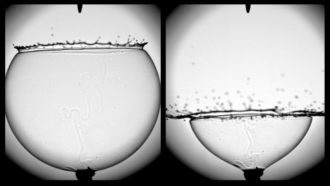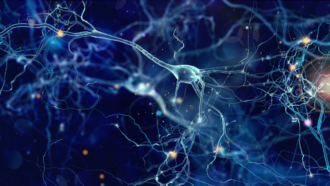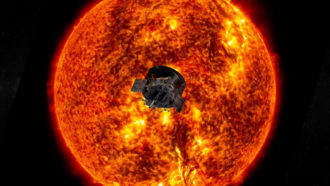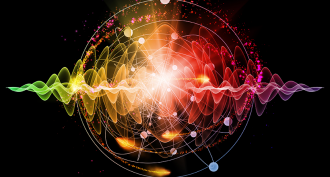HS-PS4-3
Evaluate the claims, evidence, and reasoning behind the idea that electromagnetic radiation can be described either by a wave model or a particle model, and that for some situations one model is more useful than the other.
-
 Health & Medicine
Health & MedicineWhen physicians and veterinarians team up, all species benefit
When doctors for people and those for animals share their expertise, they can discover new ways to take better medical care of all species.
By Liz Devitt -
 Climate
ClimateLet’s learn about solar power
Solar power is a way to harness energy from the sun, and lessen our reliance on fossil fuels.
-
 Physics
PhysicsA contrast between shadows and light can now generate electricity
A new device exploits the contrast between bright spots and shade to produce a current that can power small electronics.
-
 Health & Medicine
Health & MedicineNew ultrasound treatment kills off cancer cells
Low-frequency ultrasound destroys cancer cells while leaving most healthy cells intact.
-
 Physics
PhysicsSoap bubbles’ ‘pop’ reveals the physics of the bursts
A bubble’s pop is a quiet, high-pitched noise. This can reveal the forces that occur during the bubble’s demise.
-
 Brain
BrainZapping the brain may make it work right again
Sending electrical zaps to electrodes implanted deep in the brain can help people with Parkinson’s disease, depression and even obsessive-compulsive disorder.
-
 Space
SpaceNASA’s Parker probe spots rogue waves and magnetic islands on the sun
The Parker probe’s first data is giving scientists a look at what’s to come as the craft moves closer to the sun over the next few years.
-
 Tech
TechExplainer: What is the electric grid?
Most of us get electricity through a huge system of power lines and equipment that together are known as the electric grid. Here’s how it works.
-
 Physics
PhysicsExplainer: Quantum is the world of the super small
The word quantum often gets misused. What does it mean? Think small. Really, really small.
-
 Physics
PhysicsWeird physics warps nearby star’s light
Scientists have observed a bizarre effect of quantum physics in light coming from a nearby neutron star.
-
 Animals
AnimalsSpidey sense: They can hear you!
Surprise! At least some spiders can hear us. Even without eardrums, jumping spiders can still detect airborne sounds from across the room.
By Susan Milius -
 Brain
BrainOur eyes can see single specks of light
The human eye can detect a single photon. This discovery answers questions about how sensitive our eyes are. It hints at the possibility of using our eyes to study issues of quantum-scale physics.